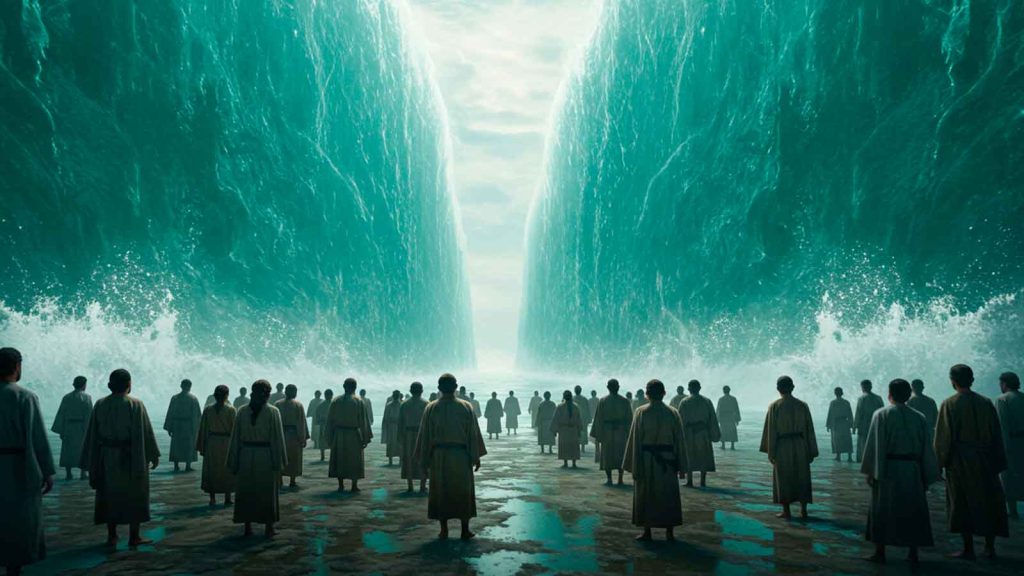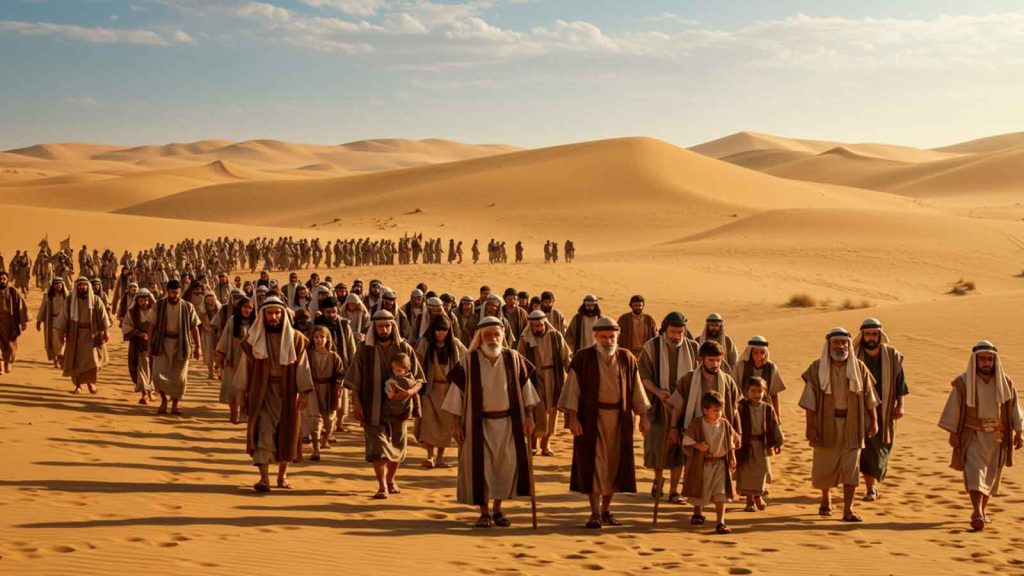The path of Moses is one of the most striking stories in the entire Bible. More than a journey from Egypt to the Promised Land, this path reveals profound principles about faith, leadership, obedience, and purpose.
In this article, we will dive into this inspiring journey, understand the key events, and reflect on how the path of Moses can still transform lives today.
The birth of a deliverer
A Hebrew baby in difficult times
The path of Moses began in a moment of crisis. Pharaoh had decreed that all Hebrew baby boys be killed at birth. To save her son, Moses’ mother hid him for three months and then placed him in a basket on the Nile River.
Raised in the palace, yet with Hebrew identity
Pharaoh’s daughter found Moses and raised him as a prince. Even so, he never forgot his roots. This contrast between two worlds already shows that the path of Moses would not be ordinary. It was divine preparation from the very beginning.
The call in the desert
The flight to Midian
After killing an Egyptian in defense of a Hebrew, Moses fled to the desert. In Midian, he worked as a shepherd for 40 years. The desert, a place of oblivion for many, was where God began to draw the true path of Moses.
The burning bush
While tending the flock, Moses saw a bush on fire that was not consumed. There, God spoke to him. From that encounter, the path of Moses changed radically. He now had a mission: to free the people of Israel.
Moses before Pharaoh
The sending by God
Though reluctant, Moses obeyed. With Aaron’s help, he returned to Egypt and confronted Pharaoh. God sent ten plagues to show His power and force the release of the people.
The plagues and divine power
Each plague was an affirmation: God was in control. This moment strengthened the path of Moses as deliverer. He became the voice of the Lord before an oppressive nation.

The deliverance and the Red Sea
The end of slavery
The tenth plague, the most devastating of all, brought death to Egypt’s firstborn. Only then did Pharaoh relent and allow the Hebrews to leave the land of bondage.
The people left in haste, carrying what they could. It was the official beginning of the path of Moses toward the Promised Land.
Pharaoh’s regret
Soon after the Israelites left, Pharaoh regretted it. He could not accept losing the workforce that sustained his empire.
Angry, he mobilized his army. Soldiers, chariots, and horsemen set out in pursuit. The multitude of Hebrews, tired and defenseless, saw the enemy approach rapidly.
A people cornered
Ahead was the Red Sea. Behind, a furious army.
With no apparent way out, the Israelites were terrified. They complained to Moses and questioned why they had left Egypt. Fear spread among the people.
But Moses remained calm. The path of Moses did not depend on human logic but on God’s direction.

The divine command
Moses prayed, and God answered with a clear instruction:
“Raise your staff. Stretch out your hand over the sea and divide it.”
Even in the face of the impossible, Moses obeyed. This attitude marked the path of Moses deeply, showing the power of faith in action.
The miracle happens
A strong wind blew all night. The waters of the sea parted, forming two great walls. In the middle, a dry path appeared.
The people crossed safely, walking between the waters with steps of faith. It was one of the most extraordinary moments in the Bible.
The destruction of the enemies
The Egyptians tried to follow the same path. But as soon as the Israelites finished crossing, the sea returned to normal.
The waters swallowed the entire Egyptian army. Not a single soldier survived. The deliverance was complete and final.
A new beginning
On the other side of the sea, the people celebrated with songs and worship. God had shown His power before everyone.
The path of Moses was now established as a symbol of faith, deliverance, and obedience. They were no longer slaves. They were a free people, led by the hand of the Most High.

The journey through the desert
The people walk but murmur
In the desert, the people faced hunger, thirst, and insecurity. Despite the miracles, they murmured frequently. The path of Moses was tested by constant complaints and rebellions.
Manna, quail, and water from the rock
Even so, God provided everything. Manna fell daily. Quail came to feed the people. And water flowed from the rock. The path of Moses was sustained by the supernatural.
Mount Sinai and the Ten Commandments
Moses ascends the mountain
God called Moses to Mount Sinai. There, he received the tablets of the Law. This event marked the path of Moses profoundly, for it brought spiritual direction to the people.
The covenant between God and Israel
The Ten Commandments were not just rules. They represented a covenant between the Creator and His people. The path of Moses was establishing its role as mediator between God and the nation.
Leadership challenges
Rebellions and idolatry
Not everyone accepted Moses’ authority. There were rebellions, such as Korah’s, and tragic moments, like the worship of the golden calf. The path of Moses was filled with trials, requiring firmness and constant intercession.
The intercession of a leader
Moses interceded before God even when the people failed. His humility and compassion made the path of Moses an example of godly leadership.
Preparation for the Promised Land
The final years
Moses led the people for decades. But because of a moment of disobedience, God did not allow him to enter the Promised Land. Even so, the path of Moses was not in vain. He prepared Joshua as his successor.
The view from Mount Nebo
From the top of Mount Nebo, Moses beheld the land that the people would conquer. There the path of Moses ended, but the legacy remained alive.
Timeless lessons from the path of Moses
Obedience brings purpose
The path of Moses shows that obeying, even with fear or doubts, leads us to the center of God’s will.
God uses ordinary people
Moses had difficulty speaking. He felt incapable. Yet God chose him. The path of Moses reveals that the power is in God, not in our ability.
Perseverance is essential
There were years of challenges. But Moses did not give up. The path of Moses is an invitation to perseverance.
The path of Moses and our life
A spiritual metaphor
We all have our own deserts—difficult situations, crucial decisions, losses, and new beginnings. The path of Moses becomes a metaphor for our own walk with God.
Called to lead
Even if you do not hold a position or title, you can influence people. The path of Moses teaches us that leadership is to serve, love, and guide with humility.
FAQ: common questions about the path of Moses
1. What is the path of Moses?
It is the life journey of Moses, from birth to death, including the deliverance of the people from Egypt and the journey in the desert.
2. Why didn’t Moses enter the Promised Land?
Because at Meribah he disobeyed a direct command from God. Even so, he was a faithful servant to the end.
3. What is the greatest miracle in the path of Moses?
The parting of the Red Sea is considered the most striking moment of the journey.
4. How can we apply the path of Moses today?
By trusting God even in difficult times and being faithful to the calling He gives us.
5. What is the legacy of the path of Moses?
An example of faith, perseverance, and humble leadership in the face of extreme challenges.
Conclusion: A Path of Faith, Courage, and Purpose
The path of Moses was not just a journey in time and space. It was a route of transformation, shaped by faith in God and obedience to His voice. Each stage of this story shows that even amid deserts, challenges, and uncertainties, the Lord remains present, guiding, sustaining, and teaching.
Moses was not perfect, but he was available. He did not seek greatness, but trusted in God’s greatness. That is why his legacy spans centuries, inspiring generations to hear the divine call and move forward with courage, even when the final destination is not yet clear.
May the path of Moses encourage us to walk our own path with firm faith, humble hearts, and eyes fixed on the eternal purpose. For when we walk with God, every step, no matter how hard it seems, leads us to something greater than we can imagine.
READ ALSO:
- Verses of Healing and Miracles: Strengthen Your Faith
- Matthew 19:6 – What God Has Joined Together, Let No One Separate
- Gifts of the Holy Spirit: Understand the Meaning
- Colossians 3:14 – The Love That Perfectly Unites All Things
- Word of Comfort in the Bible: Calm Your Heart
FOLLOW US ON FACEBOOK
I hope this has helped.